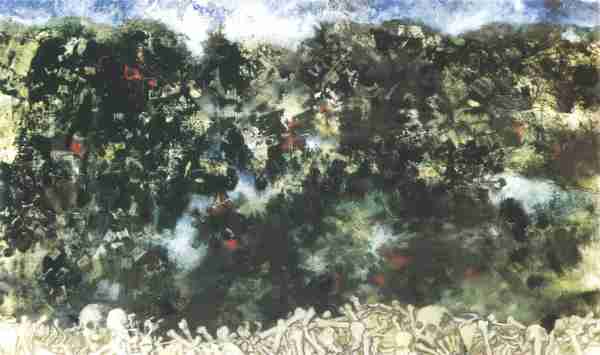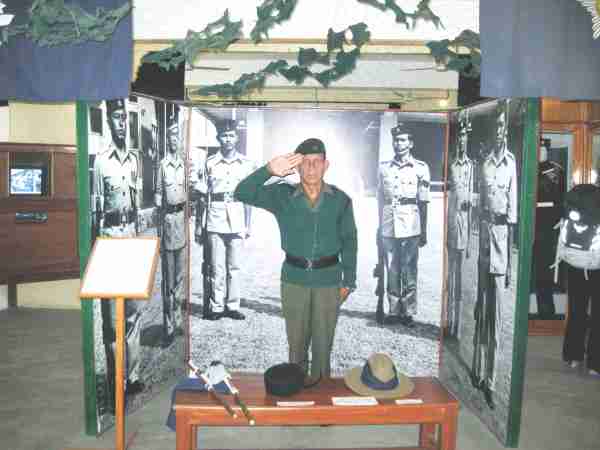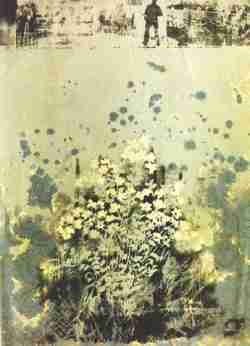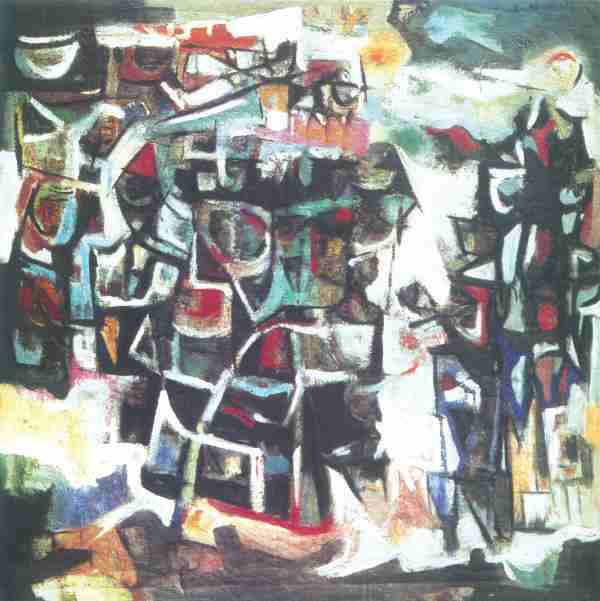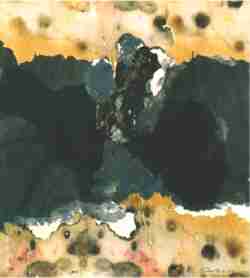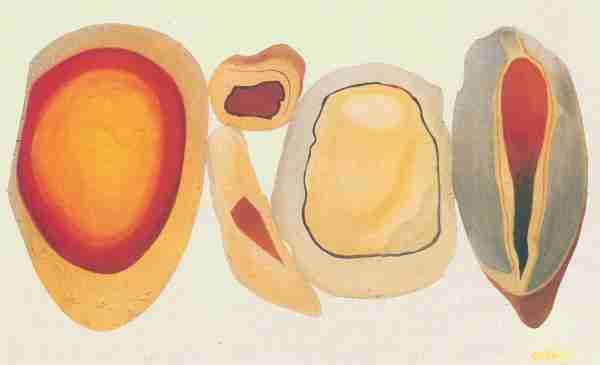| Home - Back Issues - The Team - Contact Us |
 |
| Volume 10 |Issue 47 | December 16, 2011 | |
|
|
Stories of 71 A Distant Dawn Mashudul Haque We were a family of nine brothers and sisters. Our two youngest brothers, barely in their teens, were going to college and involved in the Liberation War. They used to operate as guerilla fighters within Dhaka city with the late freedom fighter Jainal and his team. They envisaged the distant dawn of hope for a homeland of their own in that second week of December 1971. But the night of terror struck on the 14th. Our house was totally cordoned off by the Pakistan army and the notorious forces of Al Badar and Al Shams. We were curled up in a corner of a large room like a herd of sheep with the neighbouring family taking shelter with us. We were afraid of air strikes and bombing when the soldiers outside forced their way into our Central Road house. With their arms and faces covered with scarves and pieces of cloth, they made us stand in a line. They picked out our two younger brothers, blind folded them and rushed away saying “We will return them tomorrow.” So many tomorrows have passed and our brothers have never returned nor their bodies found. Our mother, who is now 85 years old by the grace of Allah, lives in the same old house and remembers with grief and sorrow that terrible and unforgettable night of terror. My parents never wanted to draw attention to our loss, for they graciously believed their sons sacrificed their lives for the cause of the Liberation War and the creation of an independent nation – Bangladesh. What we have today is at the cost of many lives.
A Wartime Tea Invitation S A Mansoor A couple of days before war was formally declared by India on December 3, 1971, I was test driving a random Prajoti assembled Vauxhall Viva car with a colleague. We usually drove from the factory near to the approach of Feni Bridge and back. To our surprise, Pakistani troops were already in position near Feni Bridge along the highway and we could hear the occasional cannon fire in the distance. On our drive back, a few miles from Feni Bridge towards Sitakundu, a Pakistani trooper stopped us to say that the Brigadier wanted to talk to us. We stopped the car on the empty Dhaka-Chittagong highway and walked to Brigadier's large tent, scared and shaking in our shoes. The Brigadier (a Pathan) was polite and invited us to tea! He said he was bored living in the middle of nowhere with no one to talk to. He was a gracious host and a perfect gentleman – but he did most of the talking. He regretted that before being sent here with his troops from West Pakistan, he was totally misinformed by his divisional HQ. He had been told that East Pakistan was full of Hindus. He said he was surprised to find at least two primary schools in a nearby village and to hear 'Azan' regularly from three or four mosques very close to his encampment. Compared to his village in North-West Frontier Province, there wasn't a mosque for five miles, let alone a primary school. He said, “We (NWFP people) should have revolted before East Pakistan!” After an hour in his company he wished us 'Khuda Hafez' and advised us to avoid going to the factory once the war started, which he predicted would begin any day. It was an eventful winter's afternoon that started apprehensively and ended with a friendly chat over tea!
The Gurkha Freedom fighter Tahmina Rahman Rimi On my first visit to Nepal this year I unexpectedly met a Gurkha soldier who fought in our Liberation War along with the Indian Army. My sister and I went to Pokhara and our guide took us to visit to the Gurkha Memorial Museum Nepal. We reached the museum too late and found the gates closed. There were some vendors opposite the museum who were selling fried delicacies and my sister asked me in Bengali whether I wanted some. The uniformed guard at the museum heard our conversation and came forward to ask us whether we were from Bangladesh. When we replied yes, he told us that he had been to our country and began to tell us the history of our war in his language. Our guide translated in broken English and we discovered that Ali Datt Khan, the collector and guard of the Gurkha Memorial Museum, had been the bodyguard of an Indian Army Commander. He told us how he had been near the border with the troops and had taken part in a battle. Making tat-tat-a-tat-tat sounds and pretending to hold a LMG (light-machine gun), the old man, with his wrinkled face and cloudy eyes, showed us how he fought against the Pakistanis. He pulled one of his trouser legs up to show us a wound where splinters from a grenade had almost made him limp. He remembered Dhaka and another place near the border but could not recall the name. I felt gratitude towards this man and remembered with respect all those who have fought for my homeland. His last words still stay with me, “Dekho beti apka desh ke liye hum khoon bahaya” (look I had shed blood for your country). House No 60 Khaleda Mariam Sajjad December 16, 1971
The morning was bright and chilly. Very few people could be seen on the streets when the curfew was lifted that morning. My Amma (mother) rushed out to go and see if Bhaiya, my Nana (grandfather), was alright. Bhaiya lived in Azimpur and we had not communicated with him for days. Our house was full of relatives who had come when their houses were attacked by the Pakistani aircrafts bombing Dhaka airport, just before the Liberation War was coming to an end. We became concerned for Amma's safety on the road as she went alone towards Azimpur. Amma returned in a few hours time screaming through the gate: 'The war is over! The Pakistanis are going to surrender! Let's go!' We ran. My three siblings following me, I trailed after Amma. She did not tell us where we were heading. She was so excited, worried and happy all at once. She hoped her eldest son would return with the others who had joined the fight for independence. We passed through the road and witnessed chaos everywhere. Looters were everywhere, scurrying away with whatever they could get, chairs, tables, placed on their heads. More people poured out on the street. Suddenly shots were heard. Everyone dispersed in different directions. Bewildered, with a young daughter and three younger children with her, Amma did not know what to do. She led us through the gate of a pink two storied house. Wanting to make sure we were safe, she ventured towards the door of the sitting room. A family was seated inside listening to BBC news. They asked us to leave immediately. Amma could not risk her children's safety. We did not look like refugees so Amma saw no reason for us to be treated this way. She made us sit on the ground next to the verandah and waited for the melee to subside. She tried in vain to make the inhabitants of the house believe the War was over. When the sounds of chaos subsided, Amma took us out of the gate to the street. There was urgency in her to take us to Bhaiya's house in Azimpur. She hired a rickshaw and put us all on it. We began our journey towards New Market. The roads now were filled with cheering people coming out on the streets welcoming the Freedom Fighters and the few Indian soldiers on military jeeps. This was the day we had all waited for. Pakistani soldiers were marching in lines from the university area towards Peelkhana, the EPR Headquarters to surrender. They still carried guns. The onlookers were angry and there was much name calling and jeering. We had just crossed the street and had reached the front of the Home Economics College gate when suddenly a few Pakistani soldiers started shooting in our direction. A few pedestrians fell on the streets, some were carried inside the boundary wall of the Azimpur colony area. Meanwhile, our rickshaw puller had abandoned his rickshaw and was nowhere to be seen. Amma huddled us and held us down to the ground in front of the College gate while shots were fired over her head showering us with debris. We believed in those moments that the end had come. When the soldiers stopped shooting, we took a road through the colony area towards Bhaiya's house. It was dusk and by then the Pakistan Army had surrendered to the combined forces at Sarwardy Uddayan. In the twilight we could see people thronging the roads and embracing members of the Mukti Bahini. There were cries and laughter from every nook and corner. Amma was restless. She reached Bhaiya's house and within five minutes was ready to return to our house. We followed her. Her eyes searched for her son inside every vehicle that passed us by. She was in a hurry to reach home hoping her son would be waiting there. The house was empty when we returned. The relatives had left. Suddenly Amma lost that smile she wore on her face since she had announced the news of the surrender. She did not speak much that evening.
I was awakened in the middle of the night and asked to make tea. There sat Bhaiya and my brother in a red shirt looking exhausted and worn. He smiled and said he did not have time and would leave soon. He had gone to Bhaiya's place and heard we were out looking for him. Soon they left and we waited for my brother to return. But he did not return the next day. But we knew he would. My brother has long been dead. Years have passed. We got busy with our lives, trying to move on, to preserve some sanity, to rebuild our lives. Amma has aged and continues to grieve for her son who she lost under controversial circumstances. Since then, life has never been the same for her, or for us. I often wonder if Amma remembers that day's incidents and if she has forgiven those responsible for his death, because I have not. The journey to my work made me take that same road we had taken on December 16, 1971 every morning and afternoon for many years. Every time I passed by that house, the memories rushed back. Often, I could not hold back the tears remembering my mother's urgent pleading with the owners of that house to allow us to stay indoors for a while and the way they pushed us out. All Amma had requested was to let us inside till the situation had calmed down a little. I still remember the humiliation, the fear, the heartbreak my mother went through that evening. There she was, a young mother excited that her country was finally free and relieved that she would not have to hide her teenage daughters night and day. Her love for freedom had taken her to the streets and there she was faced with a Bengali family who refused a momentary sanctuary to a frightened family who had nowhere else to go. But I have other memories of extraordinary kindness in times of extraordinary horror and inhumanity. I still remember the bearded man who did not hesitate to give us shelter in the verandah in his house at Jinjira when we had left Dhaka after the curfew was lifted for a short time on March 27, 1971. I remember the thousands of people who were given shelter and food by the very ordinary and poor people all over Bangladesh. I remember the kindness and affection showed by the locals when we returned under curfew on the evening of April 2, the day Jinjira was attacked. When people could not come out to help they had extended their hands over their gates and walls with jugs and pots and glasses of water for those who were able to cross the river and return to Dhaka after a horrifying experience. Thirty five years later, House No 60 had not changed much except for a signboard that reads it has been given to a developer. Small shops have cropped all around making it look like a small bustee (slum). The grandeur that I recall it had in 1971 was long gone. The pink verandahs invoke in me the same humiliation and anger I had felt so many years ago. I still compare the residents of that house to those all over Bangladesh who had risked their lives to save others. How different these people were from other freedom loving Bangladeshis and those who did not hesitate to extend their hands amidst so much despair and destruction! Compassion, so forgotten under a campaign of brutality, shone through random acts of courage and conscience amongst the poor, the non-Bengalis, the ordinary so that some might live. I remember the Pathan guard in the WAPDA office who provided us shelter at all hours whenever there was a threat to our house from the Pakistani soldiers. We could not save him from the hands of overzealous young men after the War was over. We were not at home when he was taken away. Till today I pray for his forgiveness. One house in the middle of road identified itself with those who did not believe in freedom for this country. I often wonder, should I have walked through the same gate into the living room after the War was over to just ask why they were so unkind to a desperate pleading young mother with children that evening? To me they seem no different from those who seem to have forgotten what Bangladeshis had gone through during those long months of War. For me, they are no different from those who deny the struggles and the sacrifices that made this country independent, and yet take every advantage to live in a free land. Has the time come as yet to forgive and forget? The Liberation War as I saw it Dr Khairuddin Barkat
When it was announced the National Assembly would be postponed on March 6, I left my college to return to my home village of Bhanga. I was a first year medical student. On March 7, after the historic declaration by Bangabandhu, things became clear to me and we, as a people, started getting ready for the Liberation War. Two weeks later, on 23 March, the Bangladeshi flag was hoisted in our college. Bhanga upazilla was free and safe until 25 April, when the Pakistani army entered our area. My father had a sudden heart attack that evening and without any treatment, passed away in the night. We buried him within our house. Some of my friends left to join the Liberation War but I could not leave my mother and younger brother and sisters. During the war I helped people at different camps by providing first aid. During the day, my family stayed in a bunker in our house and listened to Swadhin Bangla Betar which inspired us throughout the struggle. Within a short time but with a big sacrifice, Bangladesh came into reality on December 16, 1971 and we celebrated our victory. I returned to medical college to complete my education with the aim of fulfilling my father's dream for me.
Night of Terror Dr Hafizuddin Ahmed "Can you come home early? We haven't eaten together in a long time.” I remember my mother asking me on March 25th. I was a busy clinical assistant of Urology and wouldn't normally return home before 1am but I hurried back to my flat in Azimpur at 10pm. I was too late, my brother Jewell, a BSc electric engineering examinee, had already left for his hostel after having finished his supper. I went to bed but heard suddenly BOOM BOOM! I jumped to open the window and saw a giant blaze and couldn't understand what was going on. There were thuds of gunfire coming from Iqbal Hall. The next day I saw written on the wall of Dhaka Medical College: Jinnah Mia's Pakistan I was on my way to the hospital the next day, despite my father's objections. When I tried the cross the road suddenly two men fell to the ground after being struck by a mine. I retreated home to find my father tuning on the radio. “My dear countrymen,” President Yahya Khan broadcasted, “I had to try my utmost to handle the situation in such a manner as not to jeopardise my plan of peaceful transfer of power... I have already mentioned the efforts made by me and by various political leaders in getting Sheikh Mujibur Rahman to see reason... His obstinacy, obduracy and absolute refusal to talk sense can lead to one conclusion – the man and his party are enemies of Pakistan...” The radio went on, and I lost my temper. When curfew was lifted for two hours on March 27th, I searched for my brother. I found his body under piles of other corpses at Mitford Morgue. The writing on the wall of Dhaka Medical College had now changed. It read: Jinnah Shala's Pakistan
Copyright
(R) thedailystar.net 2011 |
||||||||
